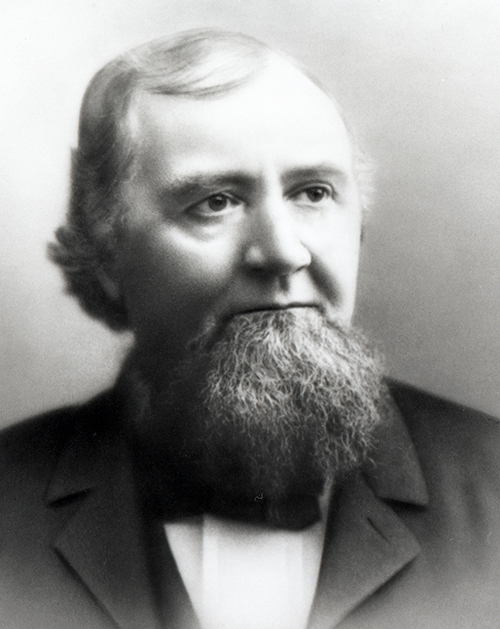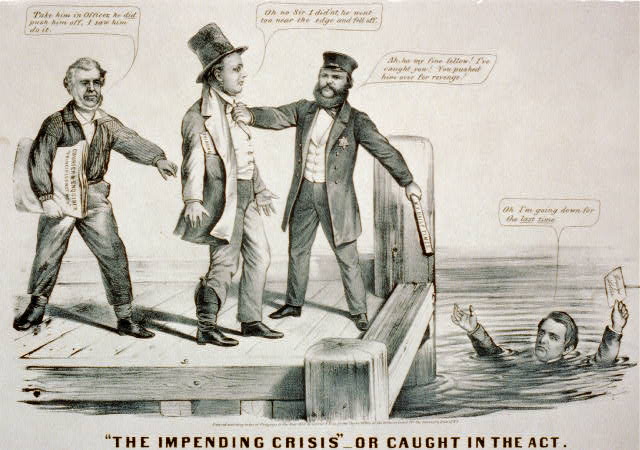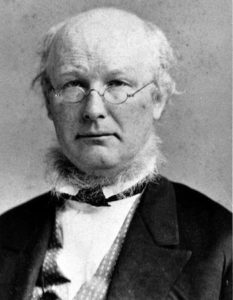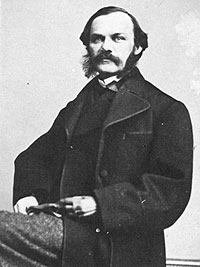VIII: Smite the Union With Flame
VIII: Smite the Union With Flame

With his nomination, Toombs set out to try and establish his candidacy. Although he was the most sectional candidate in the election, he had been somewhat lulled into the belief that was campaign would be viable on a national level by the rhetoric of other Fire-Eater who spoke of "saving the union from Republican depravity and debauchery" and "preserving the Constitution of our forefathers". Toombs and the campaign managers who choose for himself decided to buy into the belief that if presented with their arguments from the right orator, the people of the North would break from the "Traitor Douglas", "Simpleton Seward", and "Stinky Salmon" to support the Southern Democratic Party. And Toombs believed he had just the right man for the task: William L. Yancey.
To develop his campaign strategy, Toombs and his men had gathered a rather unremarkable group of politicians (if they could be called that), with the intent of conducting a national campaign. None of them were truly gifted campaigners, but they all were loyal to the tenets of the South, so Toombs eagerly brought them aboard. Serving as the head of his campaign staff, alongside work in the Eastern Southern states, would be fellow Georgian and Fire-Eater Representative Martin J. Crawford. He had long been a member of the pro-Southern cause, having even attended the 1850 Nashville Convention and having served in the House since 1855.
Also working on the Eastern Southern states would be Henry L. Benning, who was a justice on the Georgia Supreme Court and a man who Toombs had met and taken a liking to at the break off Southern Democratic Convention. Together, Crawford and Benning were to direct campaign efforts in that region. Handling the Western Southern states would be Thomas C. Hindman, a freshman Arkansas congressman with a fiery personality like Toombs', as well as a similar fighting spirit. Hoping to earn recognition and advance himself within the echelons of the Fire-Eaters, he promised to deliver all the states assigned to him, which were Alabama, Mississippi, Arkansas, Louisiana, Texas.
Finally, to direct his efforts to campaign across the North (with the exception of California and Oregon), and the men who would plan Yancey's tour of the region, would be former New York City mayor Fernando Wood, Massachusetts State Senator Benjamin F. Butler, former Massachusetts postmaster George P. Loring, and President of Dartmouth College Nathan Lord. These men went beyond the Doughfaces of the like of Buchanan or Pierce. They had come to fully accept the tenets of the Southern Democratic Party, and hoped to promote, not merely coexist, with them. They laid a tour for Yancey starting in Douglas' native Illinois, before weaving their way through the electorally rich lands of Indiana, Ohio, Pennsylvania, and New York, culminating in an event where Wood would host an event in Yancey's honor, and have him deliver a speech alongside himself, Butler, Lord, his brother and newspaper editor Benjamin Wood, prominent New York attorney James T. Brady, and several others, and to covertly try to convince Tammany Hall to support the Southern Democratic Party (or the True Democratic Party, as they referred to it in their correspondence).

Martin J. Crawford, who unofficially served as Toombs' campaign manager
As he made his way south into southern Illinois (colloquially referred to as "Little Egypt") and southern Indiana, he met a more receptive audience. He delivered a few well-received addresses, even making one appearance with one of Indiana's senators, Jesse D. Bright, who had not endorsed any candidate, but was privately known to sympathize with Toombs, which led to much acclaim and fanfare. He would encounter another gaffe, however, at the height of his trip. The boisterous Republican candidate for Indiana's governorship, Oliver P. Morton, publicly challenged Yancey to a formal public debate during a stump speech. Yancey, always up for a fight, but also having to maintain a strict schedule, decided to try and save face and shirk off Morton.
During his last address in Indiana, he referred to Morton-- a former Democrat-- as "a despicable traitor to his party, his race, and his nation." In his rebuttal a few days later, Morton would call Yancey the true traitor, and that he was a coward as well, having been driven to flight by the fear of an honest debate. Morton's response would prove to much more popular within the state, and the region as a whole, then any of Yancey's speeches, so much so that Yancey decided to cancel several campaign stops in Ohio in the belief that they had been too severely undermined by Morton. For this success, Morton would become quite famous in the Midwest, and got on the radar of several prominent politicians in Washington.
After finding both Ohio and Pennsylvania to be thoroughly unresponsive to his treasonous message, Yancey advanced to what was supposed to be the climax of his tour. After several speeches to New York crowds received with middling to no enthusiasm, Yancey would arrive at the summer home of Fernando Wood, where the event was to be held. Wood had done much in preparation, having invited as many Tammany bosses as he could convince to come, and generally just about anyone with any sort of standing within New York who was open to hearing him out.
The summer home of Fernando Wood, where Yancey's address was to be held
Sickles knew how to do his job well, and on the evening of September 15, when the event was being held, a large mob of discontented men began to gather around the home of Wood. Sensing something bad was coming, and already having disrupted the event with the loud serenades of his men, Ellsworth would direct his Zouaves away from Wood's residence. Sickles had reached out to Thomas F. Meagher, a prominent voice with New York City's immigrant, especially Irish, community to bring about the "suitable disruption". Meagher did not disappoint, and the drunken men from the slums and streets of New York City had come out in mass. For many, their virulent anger was not due primarily to any matter political in nature, but rather as a way to rage against their current, impoverished circumstances. It also likely helped that Meagher had covertly implied that a British ambassador was dining with Wood that night, which of course was not true.
Egged on by Meagher, they began belting out fierce profanities and spattering the outside walls of Wood's home with the New York City's refuse. Bonfires were lit on the streets in front of the house fed by picket fences in front of it. Although Meagher held back the mob from ever breaking into the house, many inside were afraid that was just what was about to occur. A last ditch attempt by Wood to attempt to contact John Kelly, Sheriff of the County of New York, was horribly surprised when it was revealed that Kelly was actually another ring-leader in the mob, hoping to depose Wood as Grand Sachem of Tammany Hall and install himself. Thus, when the residents inside saw an escape route intently left open by Meagher, they, led by Yancey, bolted. When this was observed, Meagher began to reign in the outrage of the mob, and was eventually able to disperse it without having taken or lost a single life.
Shaken, and inwardly scared, the night of September 15 would find Yancey getting plastered in an upper-end bar just outside of New York City. After that display at Wood's residence, he believed all his beliefs about Northerners had been confirmed, and that they were nothing better than filthy animals. Unfortunately, his drunkenness led to rambling of this belief, and even more unfortunately his ramblings were directed towards one Charles A. Dana of the New York Tribune, who eagerly wrote down every insulting and venomous slurs coming out of Yancey's lips. All of these would find their way into the paper the next morning, and Yancey's brutal rantings, which had been particularly directed towards the Irish, ensured he would have a very uncomfortable ride all the way back to Alabama, where he refused to speak anymore for the Toombs' campaign.
Elmer E. Ellsworth, Daniel E. Sickles, Thomas F. Meagher, and Charles A. Dana; the men who brought about the utter failure of Toombs' northern campaign
Despite the utter humiliation and collapse of Toombs' campaign in the North, the states of California and Oregon seemed to have more potential. With his efforts there headed up by Oregon Senator Joseph Lane, former Chief Justice of the California Supreme Court David S. Terry, and former California attorney general John R. McConnell, the Toombs campaign seemed to be making some successful inroads within the community. The vast expanses of territory separating the two states from the rest of the nation created a similar divide in mentality, and some wished for a government closer to home and one more familiar with local issues. In Southern California, Terry and Lane would find a fertile breeding ground for Breckinridge supporters.
Many white people in that region had come hoping to establish another slave state, and having been disappointed by the Compromise of 1850's proclamation of California's free state status had been petitioning to become their own state. Thus, they eagerly flocked to the messages of expanding slavery under a Toombs' administration. This region would also witness the sole attempt at campaigning not targeted towards appealing towards white Americans in the Toombs' campaign. Realizing that they would be a critical voter base from experience, Terry and McConnell would work towards stumping on issues important to Californios, or the Hispanic natives of California. Ultimately, neither man could secure much funding to pursue that venture, so that would ultimately drop it to focus on their effort on pro-slavery Californians.


David S. Terry and John R. McConnell, who led the sole attempt at racial crossover in Toombs' campaign
Last edited:




